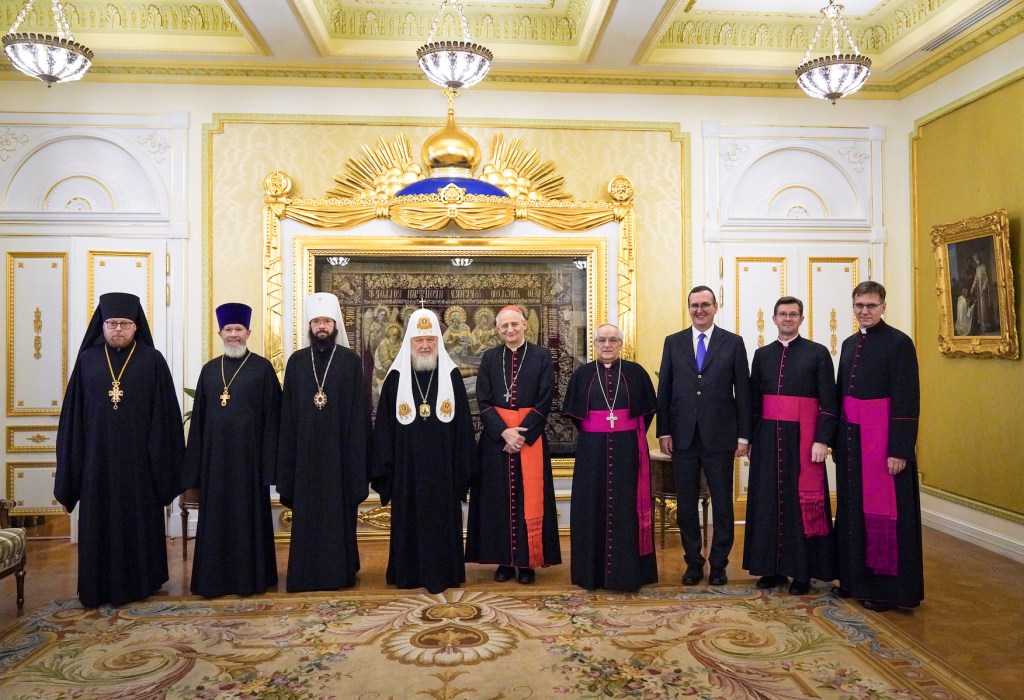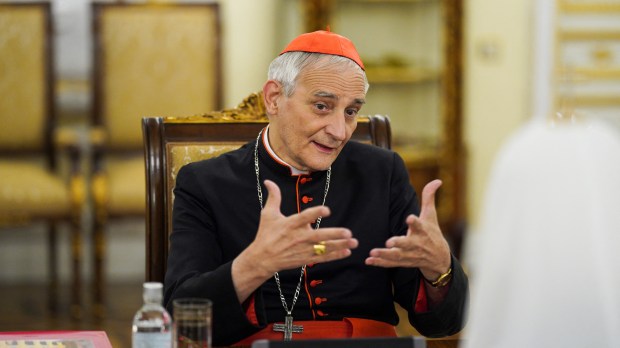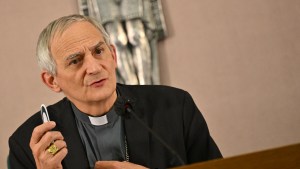Patriarch Kirill, the leader of the Russian Orthodox Church, praised the Holy See’s “mediation” in the conflict with Ukraine, after he met with a cardinal sent to Moscow by Pope Francis.
Cardinal Matteo Maria Zuppi, archbishop of Bologna, met in Moscow on June 29, 2023, with Patriarch Kirill.
The patriarch praised the Holy See’s “mediation” and assured the cardinal of his support in the search for “a just peace as soon as possible,” reports the Moscow Patriarchate website.
The Kremlin, for its part, indicated that no agreement had been reached following the meetings between the Italian cardinal and Russian political representatives. For the time being, the Holy See has not communicated on this peace mission.
The head of the Russian Orthodox Church received the envoy of Pope Francis at the St. Daniel monastery in Moscow. He underlined the great dangers currently posed by the conflict in Ukraine, and asserted that the Churches “can, through their common efforts, prevent a negative development of the political situation and serve peace and justice.”
He called for both Western and Eastern Christian communities to “participate in the process of reconciliation.”
An important supporter of Vladimir Putin since the start of the Russian invasion of Ukraine, Kirill denounced the “persecution” to which the Orthodox communities that have remained faithful to him in Ukraine are subjected. He also said he was “deeply” hurt by the “suffering of the Ukrainian people.”
Part of the Russian Orthodox Church broke away from its patriarchate to create the Ukrainian Orthodox Church in 2018.

Cardinal Zuppi, after conveying Pope Francis’ greetings to the patriarch, called for intensified dialogue between the two Churches, reports the patriarchate. “As Christians, we need to help each other understand how to act,” he said.
The interlocutors agreed that it was important for them “to focus on solving humanitarian problems in the current situation.” They agreed to “continue our exchanges.”
In addition to the Patriarch and the Cardinal, the meeting was attended by Metropolitan Anthony of Volokolamsk, the Patriarchate’s ‘Minister of Foreign Affairs’, his right-hand man Archimandrite Philaret, and Archpriest Nicholas Balashov, advisor to the Patriarch of Moscow.
On the “Roman” side were the nuncio to Russia, Mgr Giovanni D’Aniello, his “number 2” Monsignor Piotr Tarnawski, Monsignor Paul Butnaru of the Secretariat of State, and Professor Adriano Roccucci, vice-president of the Sant’Egidio community.
Patriarch Kirill praised the work of the Sant’Egidio community, of which Cardinal Zuppi was one of the first members, underlining the “positive” role it had played in maintaining “close ties” with the Russian Orthodox Church during the Cold War. Sant’Egidio, an Italian Catholic community founded in Rome in the 60s, is heavily involved in inter-religious dialogue and the defense of peace, sometimes earning it the nickname of the “United Nations of Trastevere” (the Roman district where it was founded).
Kremlin: No “concrete decisions or agreements”
During his stay in Moscow, which ends on the afternoon of June 30, Cardinal Zuppi was able to meet several Russian representatives, but not President Vladimir Putin. During his visit to Kiev last month, the cardinal was received by Ukrainian President Volodymyr Zelensky.
In the Russian capital, however, the cardinal met the president’s advisor on international affairs, Yuri Ushakov, and the presidential commissioner for children’s rights, Maria Lvova-Belova.
Following the meetings, Kremlin spokesman Dmitry Peskov said that no “concrete decisions or agreements” had been reached, but that the parties had “exchanged views and information on humanitarian issues in the context of Ukrainian affairs.” Maria Lvova-Belova made no mention of any agreement on the return of Ukrainian children – according to Kiev, Moscow has deported 16,000 of them.


